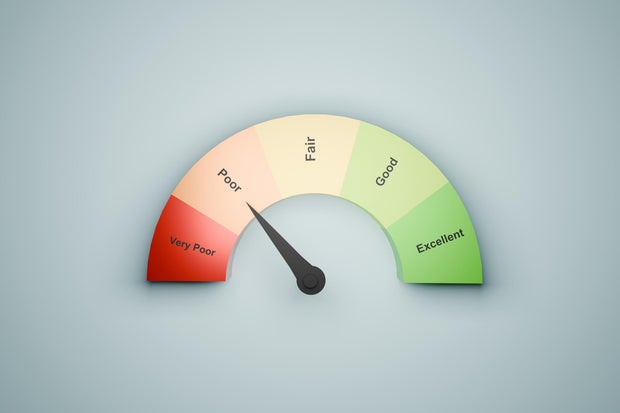 Americans' credit scores fell for the second straight year as debt and missed payments surged nationwide.
Wong Yu Liang/Getty Images
Americans' credit scores fell for the second straight year as debt and missed payments surged nationwide.
Wong Yu Liang/Getty Images
For more than a decade, Americans watched their credit scores climb steadily upward, a reassuring sign of improving financial health following the Great Recession. However, it appears the streak has come to an abrupt end. The national average credit score has officially dropped for two consecutive years, falling from 718 in 2023 to 717 in 2024, and it now sits at 715 in 2025, according to new data from FICO, the company behind the credit scores most widely used by lenders.
While a few points might seem insignificant, this credit score reversal marks a concerning shift after years of progress. What's particularly alarming isn't just the decline itself, but what's driving it: Americans are drowning in debt at levels that suggest the economy might be in worse shape than headline numbers indicate. For example, delinquency rates across multiple types of loans have reached heights not seen since the depths of the 2009 financial crisis.
That's not the only issue that's contributing to the rapid decline in credit scores, either. So, if you've seen your credit score dip recently, here's what else could be driving it — and what you can do to get your credit (and your finances) back on track.
Learn how to get help with repairing your credit today.
Here's why credit scores are dropping at a rapid pace
The forces behind this credit score decline tell a story of financial stress spreading across American households. High interest rates, which the Federal Reserve has kept elevated throughout 2025 to try and combat inflation, have made borrowing more expensive just as everyday costs have surged. This combination has pushed many Americans deeper into debt, with credit card balances swelling and more people struggling to keep up with their monthly payments.
And, the numbers help to reveal the scope of the problem. FICO data shows that delinquency rates on credit cards, auto loans and personal loans have reached or exceeded their highest levels since 2009. These aren't just statistical blips, either. They represent millions of Americans falling behind on their financial obligations. When you miss payments or max out your credit cards, your credit score takes a hit, and those types of cardholder struggles are now showing up in national averages.
Generation Z appears to be bearing the brunt of this credit crisis. About 14% of Gen Z borrowers experienced dramatic credit score drops of 50 points or more over the past year, according to the FICO data, which is double the rate seen in 2021 and also represents a higher drop than any other generation. These young adults, many of whom are entering their peak earning years, are instead finding themselves financially underwater, potentially setting back their ability to buy homes, secure favorable loan terms or even qualify for certain jobs that require credit checks.
However, the data also shows that mortgage and home equity loan delinquency rates remain near historic lows. This suggests that homeowners, who are typically older and more financially established, are largely weathering the current economic pressures. Meanwhile, younger Americans and renters are struggling with unsecured debt that carries much higher interest rates and fewer protections.
FICO analysts noted that current delinquency patterns look "more consistent with an economy in recession than one still in expansion." This disconnect between official economic indicators and ground-level financial reality suggests that many Americans are experiencing their own personal recessions, even if the official data does not yet fully align.
Find out more about the credit repair options available to you now.
How to handle your credit and debt-related issues now
If you're watching your own credit score slide, taking quick action can help prevent further damage and start the recovery process. Start by pulling your credit reports from all three major bureaus and identifying exactly what's hurting your score. Late payments have the biggest impact, so prioritizing on-time payments, even if they're just minimum amounts for now, should be your first focus.
For those who are drowning in credit card debt but still have good or better credit scores, it may make sense to consider a balance transfer to a card with a promotional 0% interest rate, giving you breathing room to pay down principal without accumulating more interest. If your credit score has already taken a hit, you might not qualify for the best balance transfer offers, but even a card with a lower interest rate could provide some relief.
You should also make every effort to contact your creditors before you miss payments, not after. Many lenders offer hardship programs that can temporarily reduce payments or interest rates without the severe credit score impact of a missed payment. These conversations are uncomfortable, but they're far less damaging than missing payments.
You can also consider getting some professional guidance on the debt issues at hand. If you feel overwhelmed, credit counseling agencies can help you set up a debt management plan, which could lower your interest rates and fees and roll your payments into one monthly obligation. For more serious debt struggles, it may be necessary to explore debt settlement programs offered by debt relief companies or, in extreme cases, bankruptcy. These options should be weighed carefully, though, as they do have downsides.
The bottom line
The drop in average credit scores marks a turning point after years of steady improvement. High borrowing costs, rising delinquencies and ballooning credit card debt are putting pressure on households across the country, especially younger Americans. But while the trends are troubling, they aren't irreversible. By focusing on timely payments, reducing balances and taking advantage of available debt relief options, you can protect and even rebuild your financial standing.
Angelica Leicht is the senior editor for the Managing Your Money section for CBSNews.com, where she writes and edits articles on a range of personal finance topics. Angelica previously held editing roles at The Simple Dollar, Interest, HousingWire and other financial publications.


















































